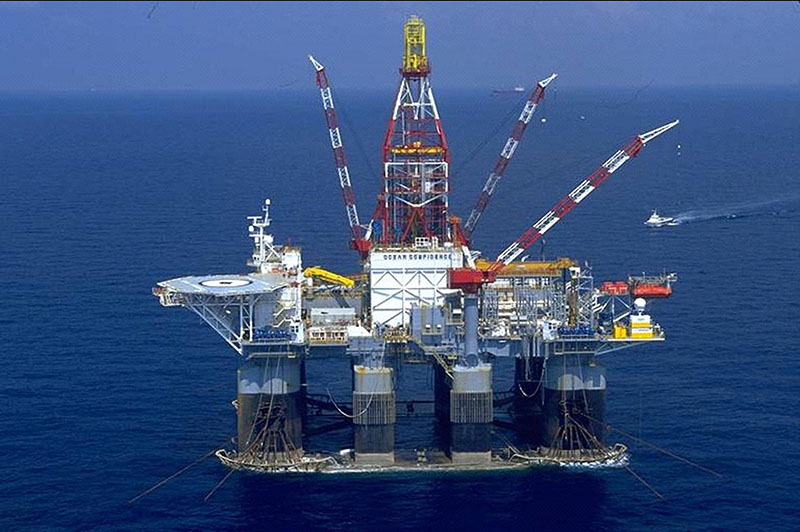(Bloomberg) — The Obama administration’s decision to forgo auctions of new oil and gas drilling rights in U.S. Arctic waters deals a blow to energy companies seeking to lock up new territory beyond the long-explored Gulf of Mexico.
Interior Secretary Sally Jewell said the move, announced Friday, strikes the right balance, by sustaining oil and gas development in the Gulf, while blocking the activity in remote and fragile Arctic waters that could be devastated by an oil spill.
"The plan focuses lease sales in the best places — those with the highest resource potential, lowest conflict and established infrastructure — and removes regions that are simply not right to lease," Jewell said in a statement. "Given the unique and challenging Arctic environment and industry’s declining interest in the area, forgoing lease sales in the Arctic is the right path forward."
The Interior Department already had abandoned plans to offer leases in the Atlantic Ocean in a proposed version of its 2017-2022 offshore oil plan but had maintained the option of auctioning tracts in the Chukchi and Beaufort seas north of Alaska. However, those waters were left out of the final version of the five-year program released Friday, leaving only 10 auctions in the Gulf of Mexico and one in Alaska’s Cook Inlet.
The U.S. Arctic is estimated to hold 27 billion barrels of oil and 132 trillion cubic feet of natural gas, but energy companies have struggled to tap resources buried below icy waters at the top of the globe.
Trump Handoff
Friday’s announcement fell short of fulfilling environmentalists’ pleas for more enduring protections that would keep U.S. Arctic, Atlantic and Pacific waters permanently off limits, though President Barack Obama could issue such a declaration any time before leaving office on Jan. 20. President-elect Donald Trump’s administration can rip up the five-year plan, but substantially replacing it and putting the Atlantic and Arctic back on the auction block would take years because of legally required public comment periods and environmental reviews.
Some Alaska residents and former military leaders had joined oil companies in arguing that drilling could drive the development of critical infrastructure in the Arctic, helping ensure the U.S. can protect its interests in the region, as melting sea ice opens up once-clogged waterways. Arctic drilling also could yield new sources of crude to fill the aging Trans-Alaska Pipeline System.
"Today’s announcement is a body blow for the Native communities, businesses, elected officials, military experts and other Alaskans who repeatedly have pleaded with the White House to allow offshore energy development in the Arctic," said Lucas Frances, a spokesperson for the industry-backed, pro-drilling Arctic Energy Center. "Having been told that local views would take priority, they have now seen that the exact opposite is true and their wishes have been ignored in the name of legacy building."
Shell’s Retreat
It is unclear whether energy companies would have lined up to bid on Arctic tracts in 2020 and 2022, under the administration’s previously proposed sales, since low oil prices, high development costs and Royal Dutch Shell Plc’s disappointing drilling campaign last year spurred them to relinquish billions of dollars worth of drilling rights.
Conservationists argued the risks of Arctic oil exploration and development are too high. Icy conditions, dark days and a lack of infrastructure could hinder attempts to clean up any oil spill in remote Arctic waters, imperiling walruses, whales and other wildlife as well as the native Alaskans that rely on them for food and clothing.
"Removing these lease sales is the right thing to do for the Arctic and America," said Jacqueline Savitz, Oceana’s U.S. senior vice president. "The decades-long push to drill in the Arctic Ocean has put this unique and diverse ecosystem at risk, cost billions of dollars and not delivered any benefits."
Environmentalists also say that the deep carbon dioxide emission cuts required to avert catastrophic climate change leave no room to burn the oil and gas that could be extracted from the Arctic and Atlantic.
Rhea Suh, president of the Natural Resource Defense Council, described the administration’s decision as a "significant milestone in protecting the fragile Arctic Ocean and limiting climate change."
"The president has the authority to do even more," Suh added. "He can ban dangerous oil and gas drilling in the Arctic and the Atlantic for all time. Now, more than ever, we need to act boldly on climate."
Bloomberg News by Jennifer A. Dlouhy





